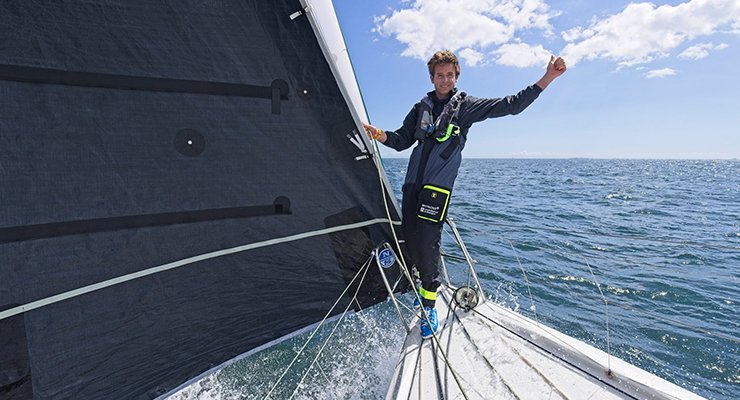From a dream to « it’s my job »

Graduating in 2019, majoring in Mechanical Engineering from UTC, Tom Laperche received a great deal of support from UTC to reconcile his studies with high-level sailing activities. In 2022, at the age of 25, he won the Solitaire du Figaro and is now skipper of the SVR Lazartigue trimaran (32m long, 23m wide). On August 29, he delivered an inaugural lecture at UTC.
The main theme of his lecture? «Moving from the dream to ‘this is my job’,» he says. A mantra he would like to share with all students. According to him, the most important thing is not to censor yourself. «Take the direction you want to follow, make your dreams come alive and true, cultivate your passions, all the more so that the UTC ecosystem allows you to do so,» he exhorts them.
A native of La Trinité-sur-Mer in Morbihan, France, Tom Laperche was naturally drawn to the open seas. His parents enrolled him in a sailing club from the age of 7. Passionate about wide open spaces, he found the Atlantic to be the ideal terrain. «I was also lucky enough to rub shoulders with the big names in ocean racing, to see their imposing trimarans, some of them 18 m long, ‘sailing’ somewhere, balanced between air and water. I was fascinated by the Route du Rhum and the round-the-world multihull races,» he explains.
So, why did he choose UTC? «Even if it took me away from my beloved ocean, UTC was the obvious choice because it was one of the best post-bac engineering schools. I chose mechanical engineering because I thought it could serve my passion for sailing, but I had no idea that this passion would become my profession. For the first two years, I concentrated on my studies, but as soon as I finished my second year, I started to get a few boating opportunities. I was selected on several occasions to be part of certain crews. So, from the third year onwards, the UTC enabled me to reconcile my studies with top-level sport by arranging my study schedules and training times. For the last three years, thanks to the support of most of my lecturers, I’ve been able to take 7 to 10 days off a month to train at the Ecole Nationale de Voile in Quiberon,» he assures us. One meeting was to prove decisive in his career. It was with François Gabart, whom he first met during a regatta in his third year. A graduate of INSA Lyon, the sailor Gabart saw in Tom a sort of replica of himself at his age. It was only natural that Tom Laperche should turn to him for his end-of-study internship at MerConcept, the company founded in 2006 by François Gabart for the purpose of developing an ocean racing team at the cutting edge of innovation and performance. «My internship focused on the design and improvement of mechanical systems to facilitate sail handling on the new M101 prototype trimaran, which foreshadowed the creation of the SVR Lartigue. In addition to the technical aspects, the course also included other aspects such as mental preparation, sophrology and nutrition, all of which are essential in ocean racing. In fact, Professor Marc Monetti’s UV SP22 ‘S’apprendre pour mieux gérer’ (Learning to manage better), which I took, is devoted to mental preparation», he points out.
His experience proved conclusive, as three years after his course, he won the ‘Solitaire’ du Figaro.
Other races to come? «François and I will be taking part in the Transat Jacques Vabre, which celebrates its 30th anniversary in 2023. The start is scheduled for October 29, with a record number of participants. François is also giving me the opportunity to sail single-handed on the SVR Lazartigue in the Arkea Ultime Challenge in January 2024 (solo round-the-world multihull race). I also hope to be on the starting line for the Jules Vernes Trophy to be held in winter 2024/2025,» he describes.
But as a company with a mission, MerConcept pursues objectives that go beyond boats for ocean racing. «At MerConcept, we want to make a concrete contribution to highlighting the innovations and high technologies of ocean racing, which could play a role in reducing environmental impact, particularly in terms of maritime mobility. To do this, we rely on a team of experts in the fields of composites, energy, electronics, aerodynamics, hydrodynamics… Hence our unique ability to innovate, test and share our advances thanks to our floating testbed platforms. One of our major objectives is to achieve more sustainable transport in the future, focusing on two key areas of our expertise. These are making boats fly and using the wind to move goods around on a large scale,» he explains.




